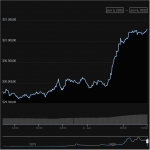Lithuania is the latest impatient member of the European Union seeking to jump the gun by creating its own crypto licensing regime, because EU laws might come too late to safeguard the sector’s reputation, local ministers told CoinDesk.
With Brussels’ landmark law – the Markets in Crypto Assets Regulation (MiCA) – potentially not in force until 2025, the Baltic nation wants to do its “homework” in advance, the country’s deputy finance minister told CoinDesk. But the plans for the law, which is set to be debated in the country’s parliament, are making some companies based in Lithuania fear for their future.
The EU is in the final stages of negotiating MiCA. The single authorization regime for the bloc of 27 nations has been years coming and could transform the sector by allowing businesses to tap a market of hundreds of millions. Some countries, however, can’t wait to grab their slice of the burgeoning sector.
The European Commission, the EU’s governing body, first asked for advice on how existing regulations apply to crypto in March 2018. Since then, crypto uptake has ballooned, and entire initiatives such as the Facebook-backed Libra, then renamed Diem, were born and died.
Even once lawmakers iron out their final wrinkles in the law, like how to treat Libra-like stablecoins, non-fungible tokens and decentralized finance, there will be a transition period for as long as two years before MiCA takes effect.
Read more: EU Commission Favors Ban on Large-Scale Stablecoins, Document Shows
“MiCA is kind of the biggest thing that’s upcoming, it’s a good decision; we support it,” Mindaugas Liutvinskas, vice minister in the Lithuanian ministry of finance, told CoinDesk in an interview. “But before we get there, it’s, what? 2025, end of 2024; we still have quite a lot of time.
“What we decided to do is take practice steps, do all our homework, to strengthen our regulatory framework,” he said, calling his proposed law a “quick fix” that MiCA can then take “to the next level.”
Image problem
Liutvinskas is worried that unless he acts fast, less upstanding companies might bring down the sector’s image.
“For both the government and market participants, the worst-case scenario would be to have some sort of a bad situation, some sort of scandal in terms of money laundering or circumventing sanctions,” he said. “Reputation is an essential resource in this line of business.”
Read more: In Estonia, the Party’s Over for ‘Hippie’ Crypto Firms
Like regulators in Estonia, Liutvinskas says he welcomes sound companies, but not empty shells that merely register in the country but operate from elsewhere.
The main provisions of the proposed law have already been published in draft and will be presented to parliament in early summer. They include a MiCA-style requirement to hold 125,000 euros ($133,000) in capital and to have anti-money laundering staff physically based in the country. The industry, meanwhile, is hoping that measures will be brought in on a slower timeline.
Capital
Liutvinskas has already agreed not to implement money laundering identity checks right away, not least because it’s not clear what the EU will expect. Negotiations were thrown up in the air by what he calls “out-of-the-box thinking” from the European Parliament, which wants a tighter grip on transactions with crypto wallets not hosted by a regulated exchange.
And it’s in this area where his proposals appear to have drawn ire from the crypto sector, which complains Lithuania is going it alone in a global market, given that in practice many jurisdictions worldwide haven’t yet implemented norms set by the Financial Action Task Force, a global anti-money laundering watchdog.
Requirements on virtual asset service providers (VASPs) to identify their customers, even for the smallest of transactions, “do not make sense,” with administrative burdens out of proportion to the risk, said Agnė Smagurauskaitė, legal counsel at CoinGate, a Lithuania-based payment and trading company.
“VASPs in other jurisdictions will not have the same obligation for data sharing which makes it close to impossible to transact with them,” she told CoinDesk in an email. And the lack of an equivalent to the banking-sector messaging service SWIFT means information may not be secure, she said.
See also: Cyprus Deputy Minister on Drafting Crypto Bill Ahead of EU Regulatory Framework
She says she supports measures to make markets more transparent and trustworthy, but not those that kill innovation or the ability to compete.
In the draft bill, “there are some points that completely destroy Lithuania’s VASP market,” she said.
Tweaks
There may yet be more tweaks in the offing for a law that Liutvinskas admits isn’t yet “fully cut into stone.” But other industry representatives reckon the new legislation, which could be in force by later this year, won’t do any damage to the country’s status as a crypto hub.
Companies “usually don’t like” stricter rules being introduced, Kęstutis Kvainauskas, a lawyer based at consultancy Ecovis ProventusLaw, told CoinDesk, but “Lithuanian requirements actually are still still considered as quite liberal.”
Read more: EU Parliament Passes Privacy-Busting Crypto Rules Despite Industry Criticism
The direction of travel, toward MiCA-style rules, is inevitable, Kvainauskas believes, and maybe smaller jurisdictions are just trying to get ahead of the game.
“At the moment, I do not see other jurisdictions able to offer something similar [to what] Lithuania can offer,” with authorization offering wide access to markets across Europe, he said.
U.K. emigrants
The country might even prove an attractive home to companies fleeing places like Estonia or the U.K., where, Kvainauskas notes, the Financial Conduct Authority, the U.K.’s financial regulator, has seemed to be unwilling to extend its current temporary registration regime.
Liutvinskas might balk at the idea that companies are merely seeking the jurisdiction with the lightest rules, saying that the practice known as regulatory arbitrage “is not something that we want to have.”
But, Liutvinskas added, Lithuania is “an innovation-friendly fintech friendly jurisdiction…. We welcome all innovative businesses that have sound business models.”
Read more about
Save a Seat Now
 BTC$31,301.41
BTC$31,301.41
5.31%
 ETH$1,889.29
ETH$1,889.29
5.43%
 BNB$311.05
BNB$311.05
4.16%
 XRP$0.402927
XRP$0.402927
2.89%
 LUNA$0.004585
LUNA$0.004585
74.44%
View All Prices
Sign up for Money Reimagined, our weekly newsletter exploring the transformation of value in the digital age.






